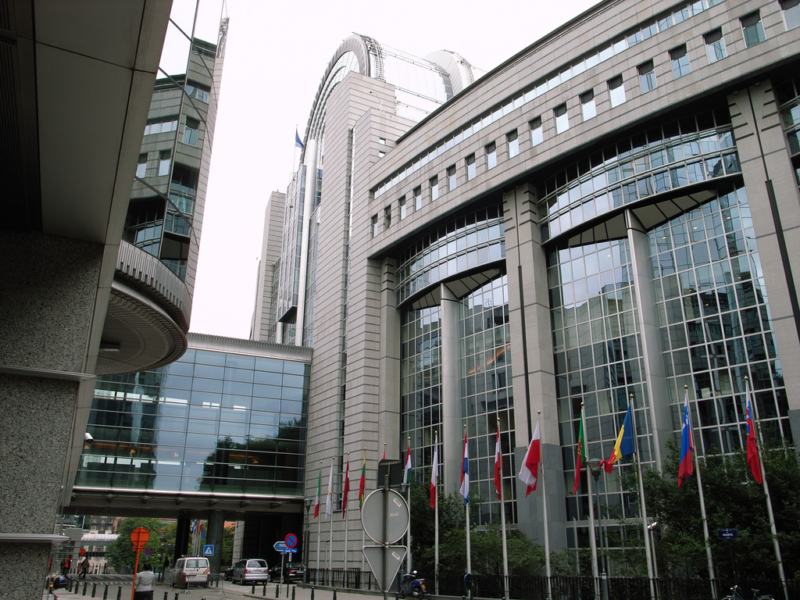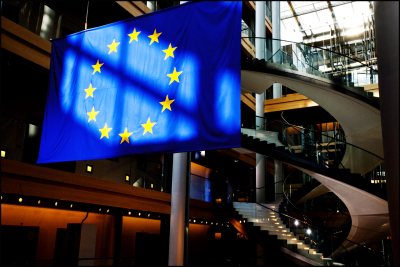Today, 22nd of June 2017, the European Parliament’s Committee on Petitions held a public hearing on the subject of ‘restoring citizens’ trust in the European Project‘.
The European Ombudsman Ms. Emily O’Reilly and experts from a wide variety of civil society, media, academic and youth organisations were invited to present their views on the matter. TI EU gave a speech on ‘How a credible fight against corruption could contribute to rebuilding trust in the European project’. You can find the speech in full, below:
The promise of the European Union is peace, democracy and prosperity. This promise is also the basis of its relationships with countries around the globe. There seems to be a clear link between the trust that Europeans have in the common project and the Union delivering on these promises. Particularly when citizens feel that the promise of prosperity is no longer delivered, they lose trust in the EU. We have seen time and time again that corruption has been an obstacle to these promises being kept.
Transparency International’s fight against corruption in the EU has therefore focussed on two broad areas – firstly, keeping the Institutions themselves as free of corruption as possible; and, secondly, promote anti-corruption and transparency reforms through EU polices that impact on member states and beyond such as corporate transparency or trade.
There have been tangible achievements in both areas. The introduction of the code of conduct for the European Parliament, reforms to EU lobbying rules or stricter “cooling-off” periods. New EU legislation on the transparency of payments to governments by oil, gas and mining companies and reforms to anti-money laundering legislation have improved the EU’s anti-corruption framework and set the global agenda.
These advances come at a time, however, when the basic purpose and functioning of the European Union is being questioned as never before – not only in the Brexit negotiations that started this week. There is a resurgent nationalism across the continent and waning confidence in the ability of the EU to deliver prosperity, security and solidarity. Trust in the institutions has declined continuously since the onset of the Euro crisis, while perceptions of corruption have increased, along with the view that the regulatory process is dominated by special interests. Indeed some critics have accused the EU’s policies of undermining democratic control and even fuelling corruption.
It is no wonder then that institutional and governance reform is a priority for the current Commission under the banner of ‘a Union of democratic change’.
Despite a long history of promoting good governance, rule of law and anti-corruption reforms, the EU now faces a number of challenges. The scale of the problem remains formidable, costing the EU between €120 billion and 1 trillion euros annually. Reforms undertaken by Member States while negotiating EU membership have stalled or in some cases reversed. Seven EU member states (Bulgaria, Croatia, Greece, Hungary, Italy, Romania and Slovakia) still score 51 or less in our CPI. Governance indicators paint a picture of stagnation or worse. In Hungary, for example, we are moving into a situation of state capture, where the government is exploiting its power for private gain, plundering the Central Bank, rerouting European and state funds into the pockets of friends and family and systematically persecuting, attacking and weakening anyone that might speak out against this: the opposition, media, civil society and even academics. There are indications that citizens in countries with particular corruption problems are looking towards the EU to rein in problems that their government might no longer be capable or willing to sort out.
The EU is hampered by a limited and contested competence in the field of anti-corruption, with no legal powers in the area of anti-bribery legislation or political party financing for example. Implementation and enforcement of anti-corruption laws is mostly the preserve of national governments.
The EU is also confronted with an “arc of instability” in its Southern and Eastern neighbourhoods, the result of geo-political shifts and conflicts, but also fuelled by high levels of corruption. The EU needs to quickly move beyond the necessary crisis-management measures and think strategically about how it can deal with the root causes of this instability – in particular corruption – by systematically engaging with the anti-corruption and pro-democracy movements in these regions, by requiring governments to be accountable for progress on anti-corruption commitments, and by ensuring its funds do not become another revenue stream that is captured by corrupt elements.
Bearing in mind these challenges, the EU needs to rethink its role in the fight against corruption. The value of the EU in an anti-corruption context will stem from its ability to provide civil society with the support and tools needed to hold those in power to account. In doing so, it can build on the recent body of transparency legislation it has put in place in areas such as corporate disclosure, public procurement and anti-money laundering.
With this in mind, let me mention a few ongoing procedures where EU policy makers could shift things in the right direction:
The EU should become an anti-corruption champion
The EU’s engagement with countries on anti-corruption issues – whether with Member States, candidates for membership, or the rest of the world – has frequently focused on institutional and legislative reforms such as anti-bribery legislation. There remains a significant ‘implementation gap’ between rules and actual practice. This had been acknowledged by the Commission’s Anti-Corruption Report in 2014. Unfortunately, the Commission has since even abandoned the soft approach to corruption in member states and cancelled any further edition of the Anti-Corruption report.
We were profoundly disappointed to learn of this decision. The decision is at odds with the clear commitments by the Commission, with the prominent emphasis placed on anti-corruption reforms in the enlargement process, with the EU’s international commitments as a signatory to the UN Sustainable Development Goals and the UN Convention Against Corruption, and indeed the public statements of the President of the Commission.
Without the report the Commission lacks any instrument or strategy to guide future EU anti-corruption policy. Member States had requested an anti-corruption strategy in 2009. But despite the EU’s ratification of the UN Convention against Corruption nine years ago, it has not even performed the first step of a self-assessment. The planned accession of the EU to the Group of States against Corruption of the Council of Europe (GRECO) is also not moving forward.
The EU and the European Commission in particular has not fully recognised the role that civil society can have in changing norms and achieving better implementation and enforcement. The ratification of the UN Sustainable Development Goals by EU Member States and EU Institutions – with clear targets on anti-corruption and good governance; an emphasis on transparent indicators of progress; and a participatory and inclusive review process – represents a unique opportunity for the EU to overhaul its approach.
What should be done to curb financial crime and illicit financial flows
Political corruption on a grand scale relies on sophisticated techniques to disguise both the source and ultimate destination of the funds. The scale of such illicit financial flows is enormous – Global Financial Integrity estimates that developing and emerging economies lost US$7.8 trillion in illicit financial flows from 2004 to 2013, with illicit outflows increasing at an average rate of 6.5 percent per year—nearly twice as fast as global GDP.
The aftermath of the Arab Spring and the revolution in Ukraine showed that the EU is a favoured destination for corrupt money. At the same time, the EU also sees major outflows as a result of money laundering, tax evasion and aggressive tax avoidance. Financial flows between government and business, through public contracting, remain Europe’s number one corruption risk.
In the fight against money laundering the 4th AMLD is currently implemented at member state level. All member states are introducing central registers of beneficial ownership for companies. Following the release of the Panama papers the Commission has already announced revisions on several aspects before the new rules even enter into force. This might mean that two important shortcomings we had identified might be addressed, namely a removal of the “legitimate interest” test for access to the registers of beneficial ownership as well as the strengthening of transparency requirements for other legal structures such as trusts.
The second aspect of financial flows that we focus on right now is that of tax transparency for large corporations. Following the Lux Leak revelations and the inquiries by the Parliament and the Commission we have repeatedly seen structures exposed in which multinationals have obtained sweetheart deals from governments, avoided billions in taxes and shifted profits and tax payments between countries, often to secrecy jurisdictions. Several of these deals have since been found to constitute illegal state aid, such as the cases of Starbucks and Fiat with the Netherlands and Luxembourg, but many more such arrangements still remain unknown. JURI and ECON just approved public country-by-country reporting on big companies’ turnover, profits, staff and other key data. This is a crucial measure to ensure public scrutiny over multinationals’ structures and tax payments. However, the two Committees also introduced sizeable loopholes for companies to sneak their way around these new reporting obligations. Just to say that country-by-country reporting already exists for the extractive industry and for banks and has been working well and without complications for these companies for several years.
What the institutions themselves can improve
Despite a number of promising transparency reforms, EU decision-making remains opaque. One of the most important EU decision-making bodies, the Council of Ministers, has made few concessions to transparency, so far abstaining from initiatives to improve lobby transparency and blocking reform to access to documents regulations. To date – I as a German citizen – I cannot find out what my government does in my name until a text reaches its final vote at the Minister level. Addressing these and more fundamental accountability gaps in an effort to make the Union more responsive to citizen input will require wide-ranging changes and a shift in culture.
As far as the European Parliament is concerned there is work to be done in three main areas: Reforms are necessary when it comes to outside jobs, revolving doors and ethics oversight by the “advisory committee”. The situation where your assistants face a cooling-off period of up to two years while MEPs can take any job the day they leave is not tenable. More than 20 MEPs currently have outside jobs with registered lobby organisations. More transparency and accountability is also needed when it comes to budget lines directly accessible to MEPs, such as the 40 million euros a year General Expenditure Allowance and the staff allowance that has just forced three former French MEP ministers to step down. Finally, MEPs need to contribute to more lobby transparency in Brussels by publishing their meetings similar to what the European Commission has been doing since December 2014.
To summarise, it is not too late for the European Union institutions to be effective champions of the anti-corruption agenda and to be an example of good governance and transparency in the way they function. This would clearly contribute towards regaining citizens’ trust in the institutions and the EU as a whole. We have a small window of opportunity now. There is growth in all EU member states. We have left crisis mode on immigration and the economy. Populists have lost several elections in a row and pro-EU reformers have had a good year so far. We cannot let this opportunity slip. Now is the time for ambitious anti-corruption reforms.






